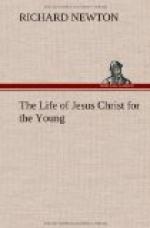In the nineteenth chapter of Proverbs and seventeenth verse we have a very clear proof of the lesson we are now considering. Here we find it said: “He that hath pity upon the poor, lendeth unto the Lord; and that which he hath given will he pay him again.” Having pity on the poor, as here spoken of, means giving them such things as they need. Whatever we use in this way God looks upon as so much money lent unto him; and we have his solemn promise that when we lend anything to him, in this way, “He will pay us again.” And when he pays again what has been lent to him, it is always with interest. He pays back four, or five, or ten times as much as was lent: to him. This proves that “giving is God’s rule for getting.”
One other passage is all that need be referred to in order to prove that the lesson of liberality which our Saviour taught is the same lesson which the Bible teaches everywhere. In Eccles. xi: 1, God says, “Cast thy bread upon the waters; for thou shalt find it after many days.”
If we should see a man standing on the end of a wharf and throwing bread upon the waters, we should think that he was a foolish man, who was wasting his bread, or only feeding the fishes with it. But suppose that you and I were travelling through Egypt—the land of the celebrated pyramids and other great wonders. The famous river Nile is there. During our visit the inundation of that river takes place. It overflows its banks, and spreads its water over all the level plains that border on the river. This takes place every year. And when the fields are all overflowed with water, the farmers go out in boats, and scatter their grain over the surface of the water. The grain sinks to the bottom. The sediment in the water settles down on the grain, and covers it with mud. By and by the waters flow back into the river. The fields become dry. The grain springs up and grows. The mud that covered it is like rich manure, and makes it grow very plentifully, and yield a rich harvest. And here we see the meaning of this passage. God makes use of this Egyptian custom to teach us the lesson of liberality that we are now considering. He tells us that the money which we give to the poor, or use to do good with, is like the grain which the Egyptian farmer casts upon the water, and which will surely yield a rich harvest by and by.
This teaches us the lesson of liberality. And when we think of all these passages, we see very clearly that the Bible teaches the same lesson which Jesus taught when he said to his disciples, “Give, and it shall be given unto you.” And what we learn, both from the teaching of Christ, and from the different passages referred to, is—that “giving is God’s rule for getting.”
And now, having seen some of the Bible, proofs for this lesson of liberality, or for this rule about giving and getting, let us go on to speak of some of the illustrations of this rule. These are very numerous.




